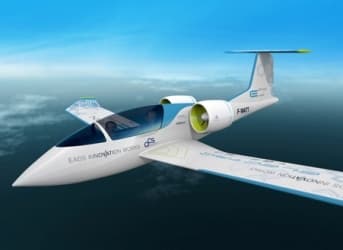Airbus Group, the international consortium that makes huge jetliners, has debuted a new kind of aircraft: a tiny, electrically powered plane called the E-Fan.
The experimental plane is a two-seater and measures a mere 19 feet in length, with a wingspan of just over 31 feet. The twin-engine E-Fan’s power comes from 120 250-volt lithium-ion polymer batteries that can move the craft at speeds up to 136 mph.
And it actually works, as demonstrated on March 11 during a test flight in Bordeaux, France, and since then at the annual Berlin Air Show.
As for emissions? Zero. Noise? Very, very little. Ride comfort? Smooth, with little vibration and no propeller torque. And Airbus estimates the cost of an hour’s flight at as little as $16, compared to about $55 for a conventional plane of similar size.
“It's a very different way of flying,” said Jean Botti, chief technical and innovation officer at Airbus Group. “Absolutely no noise, no emissions.”
But Airbus isn’t ready to ramp up production of the existing E-Fan. First, the plane is noticeably slower than similar conventional planes, and its batteries need recharging after only one hour of normal flight, and after 30 minutes of an aerobatic routine.
Nevertheless, Airbus will continue research on the plane’s battery technology and already has plans for two versions of the craft. One is the E-Fan 2.0, an all-electric plane to be marketed as a training craft, and the four-seat E-Fan 4.0 hybrid, designed for eventual commercial use as a commuter plane. Plans for the E-Fan 4.0 also call for a conventional engine for extended range.
Airbus plans to build a factory and pilot training school for the E-Fan aircraft near the Bordeaux Merignac Airport in southwestern France. If successful, both planes would be sold by Airbus subsidiary Voltair.
Airbus Group has been researching alternative aircraft for years. The consortium drew up plans for a full-sized helicopter and a glider with hybrid electric motor with an Airbus-designed battery system. It even conducted flight tests of a miniature drone aircraft powered by an advanced fuel cell.
Related Article: Why I Love Tesla, but Dislike TSLA
Research on the E-Fan was conducted by Airbus Group Innovations and Aero Composite Saintonge. Their first result was called the Cri-Cri, which Airbus calls the first all-electric four-engine aerobatic plane.
Botti said the point of the research is not to add the E-Fans 2.0 and 4.0 to their product line, but as the first step in a whole new approach to aviation. “We're trying this. It's not to enter the business of small aircraft,” he said. “It's to learn to make a new business.”
Airbus’ goal, Botti explained, is to manufacture a hybrid-electric commuter plane with a capacity of up to 80 and a flight range of three hours. One such aircraft being researched is the E-Thrust, with six fans powered by gasoline during ascent and cruise, then unpowered so the plane can glide on electric power during descent.
Botti says Airbus hopes to have such a plane ready by 2050. In fact, all Airbus’ alternative aircraft research is part of the EU’s Flightpath 2050, whose goal is a 75 percent reduction in aircraft emissions by then, and 65 percent less noise.
By Andy Tully of Oilprice.com


















And, the probability that this 'thing' will ever be produced? ....Zero! But it makes silly people like Andy feel good.